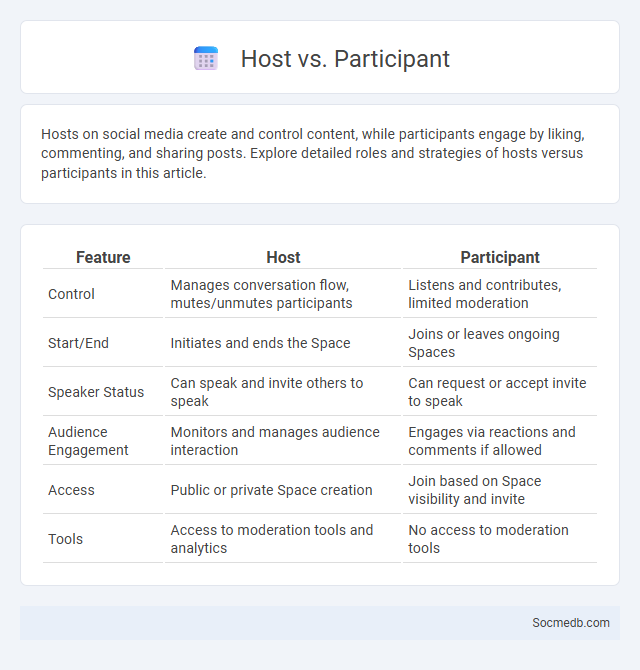
Photo illustration: Host vs Participant
Hosts on social media create and control content, while participants engage by liking, commenting, and sharing posts. Explore detailed roles and strategies of hosts versus participants in this article.
Table of Comparison
| Feature | Host | Participant |
|---|---|---|
| Control | Manages conversation flow, mutes/unmutes participants | Listens and contributes, limited moderation |
| Start/End | Initiates and ends the Space | Joins or leaves ongoing Spaces |
| Speaker Status | Can speak and invite others to speak | Can request or accept invite to speak |
| Audience Engagement | Monitors and manages audience interaction | Engages via reactions and comments if allowed |
| Access | Public or private Space creation | Join based on Space visibility and invite |
| Tools | Access to moderation tools and analytics | No access to moderation tools |
Introduction to Host, Participant, and Spaces Host
Social media platforms facilitate interactive spaces where Hosts lead discussions, Participants engage by contributing content or comments, and Spaces Hosts moderate live audio conversations. Hosts initiate and guide sessions, setting the tone and ensuring structured interactions, while Participants enrich the dialogue with diverse perspectives. Spaces Hosts manage real-time audio rooms, fostering community engagement through moderated, topic-driven conversations.
Defining the Role of a Host
A host in social media serves as the primary facilitator of live or interactive content, engaging audiences by guiding conversations, managing participant interactions, and maintaining the flow of the session. This role demands strong communication skills, real-time problem-solving, and the ability to foster community engagement while aligning with the platform's goals. Effective hosts enhance viewer retention, promote content discoverability, and drive brand loyalty through authentic and dynamic presence.
Understanding the Responsibilities of a Participant
Engaging in social media requires carefully managing your digital footprint by sharing respectful, accurate content and respecting others' privacy and opinions. You must be aware that your posts contribute to online culture and can impact both your personal and professional reputation. Responsible participation includes adhering to community guidelines and being mindful of how your interactions influence others.
What is a Spaces Host?
A Spaces Host is an individual who facilitates live audio conversations on Twitter Spaces, providing a platform for real-time interaction and discussion. They control the session by inviting speakers, managing participants, and steering the topics to keep conversations engaging and relevant. Hosting a Space enhances community building and allows direct engagement with an audience through live audio.
Key Differences: Host vs Participant vs Spaces Host
Social media roles vary distinctly, with a Host controlling content and interactions by managing groups or pages, while a Participant engages primarily through comments and sharing within those communities. A Spaces Host on platforms like Twitter uniquely facilitates live audio conversations, directing discussions in real-time and ensuring an inclusive environment. Understanding these roles helps you optimize your social media presence by choosing how actively you lead or interact with your audience.
Benefits and Challenges of Each Role
Social media offers distinct benefits and challenges across various roles such as content creators, marketers, and consumers. Content creators gain visibility and engagement but face constant pressure to produce relevant material while managing audience feedback. Marketers benefit from targeted advertising and measurable analytics yet must navigate privacy concerns and algorithm changes, whereas consumers enjoy connectivity and access to information but risk exposure to misinformation and digital addiction. Understanding these dynamics helps you maximize the advantages and mitigate the drawbacks specific to your social media role.
Choosing the Right Role for Your Needs
Choosing the right social media role depends on your specific goals, whether it's brand building, customer engagement, or content creation. Understanding the distinct functions of community manager, content strategist, and social media analyst helps optimize your online presence effectively. Your success relies on aligning the role with your business objectives and target audience preferences.
Security and Control: Host, Participant, and Spaces Host
Securing your social media presence involves understanding the distinct roles of host, participant, and spaces host, each with tailored control settings to protect personal data and manage interactions. Hosts have comprehensive authority to moderate content, control membership, and enforce security protocols, ensuring a safe digital environment. Participants benefit from privacy settings and reporting tools, empowering you to retain control over your information and engagement within these dynamic online spaces.
Best Practices for Hosting and Participating
Effective social media hosting and participation involve creating engaging, relevant content tailored to your audience's interests and behaviors. You should consistently respond to comments and messages to foster community trust and increase interaction rates. Incorporating analytics tools helps you optimize your strategy by understanding peak engagement times and content performance.
Conclusion: Selecting the Optimal Role for Success
Choosing the optimal role in social media hinges on aligning your strengths with platform demands and audience expectations to maximize engagement and growth. Your success depends on leveraging analytics insights and adapting content strategy to evolving trends for sustained influence. Mastering these elements ensures a competitive edge in the dynamic digital landscape.
 socmedb.com
socmedb.com